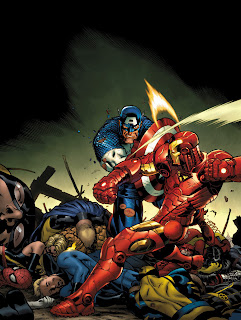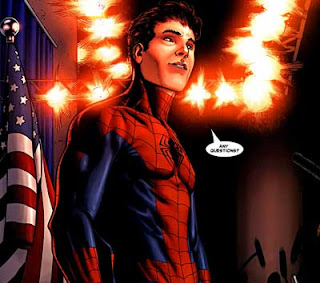Civil War
is my favorite comic arc in the history of ever and it had better be yours too.
Good? Good.
If you aren’t hip to the
kids’ stuff these days, Civil War
doesn’t actually refer to the War Between the States, or any other kind of
historical event wherein a nation split amongst factions. Instead, it deals
with a different kind of civil war: one among superheroes.
We dealt with this same idea
last week in Kingdom Come, where the
superhero populace of the DC Universe had become so corrupt with power that it
threatened to end the world. Well, this time we’re coming at it from Marvel’s
side, and the story is unsurprisingly different.
It’s always been a thing
with DC and Marvel. DC writes stories where the characters are virtually gods –
a rewritten mythology for the modern age. Their characters have relatively few
weaknesses, and the villains are larger-than-life unkillable terrors. Marvel,
on the other hand, likes its heroes a little weaker and a little more mortal.
Its villains too. The stories Marvel tells can still be epic, but usually on a
smaller scale (galactic rather than cosmic), and the character arcs tend to
hold more water.
The actual Civil War comic is comprised of a series
of crossover comics from 2006-2007, written by Mark Millar, art by Steve
McNiven. The series crossed through nearly every major Marvel franchise, and
kind of seriously ruled. Its tagline was “Whose side are you on?” and it
followed the whole superhero community when it faced the ultimate question:
should superheroes have to give up their secret identities?
That may not immediately
sound like the be-all end-all thought for superhero-kind, but it really is. It
gets at the heart of what it means to run around wearing tights, whether the
mask is actually important, and who is responsible for these guys anyway. But
the real reason this series rules? Because the answers are not easy, and they
are not comfortable.
And because people you love
are on both sides of the line.
The story follows the
implementation of a governmental bill requiring the registration of all
superhumans. The bill, brought about because of an extremist response to
meta-human destruction and death, requires that all heroes publicly register
their identities. Tony Stark, Iron Man, is for it. Steve Rogers, Captain
America, is against it.
That right there is the crux
of the whole story. If you’ve only really been exposed to those characters
through the Marvel Movie Universe (Avengers,
basically), then I need to explain to you a thing. Cap and Iron Man are bros. Best
friends. Incredibly close. Best men at each others’ weddings close. So when we
find out that these two guys are split ideologically, and that these are the lines they’re split on,
it’s devastating.
Moreover, it’s surprising.
Tony Stark is fronting for the government and supporting more Congressional
oversight? That seems weird. And Steve Rogers fighting against his government
and openly defying it? I feel dirty inside.
But that’s all part and
parcel of what makes this a great story. The human element.
A huge part of that is Peter
Parker. Now, as you all know, Peter Parker is Spiderman, but he really doesn’t
want anyone to find that out. In the comics, and in the movies, this is because
Peter actually has a life, and people who love him. He’s married to MaryJane.
He’s still close with Aunt May. His decision to protect his identity is not a
casual one, especially since he tends to deal more with street thugs that would
have no compunction about roughing up his wife.
Peter gives up his identity
under pressure from Tony and the government. Then he realizes that he’s made a
huge mistake, upon seeing the giant prison that Iron Man and Mr. Fantastic make
to hold all the superhumans who won’t agree to registration. He decamps to the
other side. The arc actually ends with him huddling back into hiding, and
trying to make a life for himself again. Oh, and with him hating Tony Stark’s
guts.
Why do I mention all of
this? Well, because I think Peter’s story, and the flip-flopping he does, sum
up really well how we all feel about this issue. And by issue, I don’t mean
whether or not superheroes should get to keep their secret identities.
I mean the conflict between
security and freedom.
We think about it a lot,
even if we don’t really think about how we’re thinking about it. In America,
the gun control debate rages on because we’re really not sure where we stand on
this. We created secret prisons on the other side of the world to keep us safe
from terrorists who now want to kill us even more. We passed laws that say we
can spy on our own. We live in a screwed up world and the only thing we can’t
figure out is what will be better: more security, or more freedom?
This is where Peter comes
in. At the beginning, he thinks the choice, while not easy, is clear: more security.
When he gives up his name to the government, he’s implying that he will trust
them to use that information wisely, and to protect him should he need it. But
when he finds that he government may not be entirely trustworthy, he takes it
back. He changes his mind. He chooses freedom.
I have to admit that I
really don’t know which one I’d choose, if I had to.
It’s easy and fun to think
that we would immediately pick freedom, and certainly that’s the more colorful
option. Unfortunately, I know how craven and cowardly I can be when I’m not
being my best self, and I also know the pleasant comfort of security. And who
are we to say that security is a bad thing, anyways? Why is it so easy to
dislike, from a distance, that is?
If I had to take a stab at
it, I would say it’s because at our core, we want to be free. Free from what,
we usually don’t know, but we want to be free of something. That’s what fuels
most mid-life crises, burnouts, and hippies travelling the globe. We want to be
free.
When I described the plot up
there, it was easy to tell that Captain America was the good guy, right? Even
though you knew that there was a gross amount of legitimate devastation that
Iron Man was trying to prevent. Even though they both really had reasonable
points. And even though Cap was the one to make the first violent gesture?
It’s not all that weird when
you think about it, that Iron Man chose security and Captain America chose
freedom. Tony was a man who built himself a giant suit of armor to save his own
life. He knows security very well. But Steve was the guy who volunteered for a
war he was unfit to serve in, and took a leap into potentially deadly science,
because he believed it was the right thing to do. So, not surprising at all
really, in the end.
But Cap is still definitely
the good guy to us, isn’t he?
Here’s the other thing:
security is easier, but freedom is better. Better, I would argue, because it
requires of us the one thing that security refuses is. Freedom requires that we
trust each other, and that is both noble and nearly impossible.
And, as a matter of note,
that’s not how the story ends. I hate to break it to you, but Cap doesn’t win
this one. In fact, and here I’m going to go into SPOILERS for a seven year old
series, he actually is taken into custody, then killed on his way to the
courthouse. (Don’t worry, he got better.)
In the end, history
vindicates security, and stomps on trust. Tony Stark becomes head of SHIELD.
Heroes flee for Canada, and the bill gets passed. Sure, it’s not as draconian
as it could have been, but still. Still.
What’s the point I’m trying
to make with all of this? Well, aside from my usual point, that I would very
much like it if Marvel/Disney were to make Avengers
3 or something based on the Civil War
arc, I also want to make a larger point about trust and freedom.
We’re at a point as a
society where we don’t trust anyone. Not each other, not our government, not
our collective humanity. We have an incredibly low view of ourselves and each
other. But we still want to be free. And I’m here to tell you that we can’t be
free until we act like we are. It sounds weird but it’s true. In order to be
free, you have to act like you are before you feel it. Because the act of
trusting each other and going about our daily lives again is what will make us
free.
And also I would like to
make a smaller point, that I love this arc.







Great post! Really timely with the whole transparency "whistle-blower" headlines right now. Important decisions in the microcosm of comics. :)
ReplyDeleteI think that's one of the things I love most about comics and other forms of speculative fiction. Not only are they really cool to read, but they offer us an opportunity to view our problems from another perspective. Plus, superheroes and aliens are nice too. :DDD
Delete
ReplyDeleteThe Watch Furious 7 is upcoming movie of paul walker.This movie goes the last time appearance of paul walker.
Would you rather be safe or free? Bascially it is a civil war story about which we are talking on the page. I want to know more for the define college-paper.org review story where they are always show the previous time about which we cannot talk more.
ReplyDelete